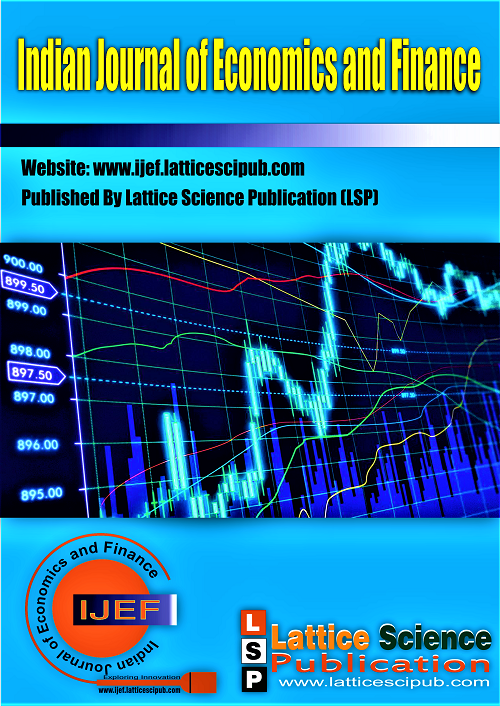Volatility Analysis of Indian Banking Sector using Bollinger Bands
Main Article Content
Abstract
This research paper aims to analyze the bank volatility in India by examining various factors that contribute to fluctuations in the Indian banking sector. The study investigates the impact of regulatory reforms, macroeconomic indicators, financial stability, and global factors on bank volatility. The research utilizes a comprehensive dataset covering a period of one year i.e (01-04-2022 to 31-03-2023) to provide an in-depth understanding of the dynamics of bank volatility in India. We have used Bollinger bands to understand the volatility of three premier banks in India namely, HDFC Bank, ICICI Bank and STATE BANK OF INDIA in Indian stock market. The findings of this study will contribute to the existing literature on banking in emerging markets, understand the factor of volatility in present times and will also provide valuable insights for policymakers and stakeholders in the Indian banking sector.
Downloads
Article Details

This work is licensed under a Creative Commons Attribution-NonCommercial-NoDerivatives 4.0 International License.
How to Cite
References
Acharya, D., & Rajput, P. (2016). Macroeconomic Factors and Indian Stock Market Volatility. International Journal of Scientific Research and Management, 4(8), 5241-5247.
Banerjee, P. (2019). Market Microstructure and Stock Market Volatility: Evidence from India. Journal of Quantitative Economics, 17(2), 331-353.
Bansal, V., & Kaushal, S. (2019). Impact of Economic Factors on Stock Market Volatility: Evidence from India. Journal of Quantitative Economics, 17(3), 533-554.
Behera, P. K., & Tripathy, T. (2018). The Impact of Investor Sentiment on Stock Market Volatility: Evidence from India. Theoretical Economics Letters, 8(11), 2970-2983.
Bhattacharya, A., & Kumar, S. (2019). Market volatility and trading activity in Indian stock market. Journal of Emerging Market Finance, 18(3), 261-278.
Goyal, A., & Kumar, S. (2020). Stock Market Volatility and Investor Confidence: Evidence from India. Journal of Emerging Market Finance, 19(2), 201-218.
Gupta, R., Jhunjhunwala, S., & Mishra, D. (2017). An analysis of volatility dynamics in the Indian stock market. Journal of Emerging Market Finance, 16(1), 91-109.
Jain, A., & Biswal, P. (2018). Macroeconomic determinants of stock market volatility in India: Evidence from GARCH modeling. Global Business Review, 19(1), 158-173.
Kapoor, S., & Kumar, B. (2018). Global Financial Crises and Stock Market Volatility: Evidence from India. Indian Journal of Finance, 12(7), 13-25.
Kumar, A., & Tiwari, A. K. (2018). Stock Market Volatility and Diversification: Empirical Evidence from India. Global Business Review, 19(5), 1140-1154.
Kumari, P., & Dhal, S. (2018). Modeling and forecasting volatility in the Indian stock market. International Journal of Financial Studies, 6(3), 64.
Mishra, S., & Kumar, S. (2014). Stock Index Futures Trading and Stock Market Volatility: Evidence from India. IIMB Management Review, 26(2), 79-88.
Mishra, S., & Mishra, S. K. (2017). Sectoral Analysis of Stock Market Volatility: Evidence from India. Global Business Review, 18(4), 877-889.
Naidu, G. N. (2019). Stochastic volatility models in Indian stock market. Journal of Quantitative Economics, 17(2), 271-291.
Patel, A., & Mishra, R. K. (2012). Impact of Macroeconomic Indicators on Indian Stock Market Volatility: An Empirical Study. International Journal of Financial Management, 2(4), 49-61.
Sahoo, S., & Mishra, D. (2017). Stock return volatility patterns in India: Evidence from the National Stock Exchange. Journal of Asian Finance, Economics, and Business, 4(1), 5-13.
Sharma, S., & Kumari, A. (2020). Estimating and forecasting stock market volatility: Evidence from India. Journal of Emerging Market Finance, 19(2), 232-260.
Srivastava, A. K., & Arora, R. (2016). A study on impact of global shocks on stock market volatility: Evidence from Indian stock market. IIMB Management Review, 28(3), 135-146.
Available at https://goniyo.com/blog/the-evolution-of-banking-in-india/
Available at: https://rbidocs.rbi.org.in/rdocs/Publications/PDFs/0HOS2022_F0D15432F09C8484FABECFC6577A541A9.PDF
Available at: https://www.investopedia.com/terms/v/volatility.asp
Keswani, S., & Wadhwa, B. (2019). Evaluating the Impact of Macroeconomic Variable on Indian Stock Market. In International Journal of Engineering and Advanced Technology (Vol. 8, Issue 6, pp. 4427–4434). https://doi.org/10.35940/ijeat.f8972.088619
K*, K., & Nirmala, Dr. M. (2019). Foreign Portfolio Investment And Macroeconomic Factors In India. In International Journal of Innovative Technology and Exploring Engineering (Vol. 8, Issue 12, pp. 2056–2058). https://doi.org/10.35940/ijitee.l3259.1081219
Radha, P., & Gopinathan, Dr. N. (2019). An Empirical Analysis of Impact of Macroeconomic Variables on Indian Stock Market. In International Journal of Recent Technology and Engineering (IJRTE) (Vol. 8, Issue 3, pp. 2033–2038). https://doi.org/10.35940/ijrte.c4528.098319
Bhimavarapu, V. M., & Rastogi, Dr. S. (2021). Dividend and Bank Performance in India: Evidence using Panel Data Analysis. In International Journal of Management and Humanities (Vol. 6, Issue 1, pp. 1–4). https://doi.org/10.35940/ijmh.l1370.096121
Caporali, R. P. L. (2023). A Statistic Method for the Prediction of the Succession of Bear and Bull Stock Market. In International Journal of Basic Sciences and Applied Computing (Vol. 9, Issue 6, pp. 1–7). https://doi.org/10.35940/ijbsac.f0482.029623





